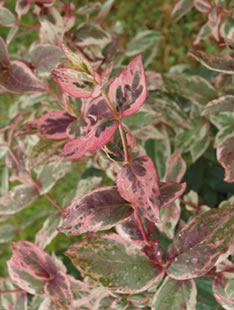Developing Non-Invasive Nursery Crops

In certain cases, plants that are grown and valued as important landscape plants can become weedy. The development of seedless cultivars is an ideal solution to the problem whereby these economically important plants can be grown and used to enhance our environment while minimizing their potential for invasiveness. One common approach for developing seedless plants is to create triploids. Although triploids typically grow and function normally, they have an inherent reproductive barrier in that the 3 sets of chromosomes cannot be divided evenly during meiosis yielding unequal segregation of the chromosomes (aneuploids) or complete meiotic failure. Triploids have been developed for many crops including seedless bananas, watermelons, grapes, citrus, and althea.

A new seedless, non-invasive cultivar
of hypericum developed at the MCI Lab
Polyploid plants are common in nature. Triploids can arise naturally or can be bred by hybridizing a tetraploid (4X) with a diploid (2X) to create seedless triploids (3X). Triploids can also be developed by regenerating plants from endosperm tissue found in seeds (which is naturally 3X). Other benefits of this approach include enhanced flowering and re-blooming, reduced fruit litter, and reduced pollen allergens. This work has been generously supported by the USDA Floral and Nursery Crops Research Initiative, the North Carolina Nursery and Landscape Association, Hoffman Nursery, and the J. Frank Schmidt Family Foundation. For more information see:
- Ranney, T.G. 2004. Population control: Developing non-invasive nursery crops. Proc. Intern. Plant Propagators’ Soc. 54: 604-607.
- Olsen, R.T., T.G. Ranney, and D.J. Werner. 2006. Fertility and inheritance of variegated and purple foliage across a polyploid series in Hypericum androsaemum L. J. Amer. Soc. Hort. Sci. 131(6):725-730. (JASHS cover).
- Trueblood, C.E., T.G. Ranney, N.P. Lynch, J.C. Neal, and R.T. Olsen. 2010. Evaluating fertility of triploid clones of Hypericum androsaemum L. for use as non-invasive landscape plants. Hortscience 45(7):1026-1028.
- Trueblood, C.E. 2009. An invasive species assessment system for the North Carolina Horticulture Industry. MS Thesis, N.C. State Univ., Raleigh.
- Ranney, T.G., D.H. Touchell, T. Eaker, J. Mowrey, N. Lynch, and J. Smith. 2010. Progress developing non-invasive nursery crops. IPPS Eastern Region Newsletter. Nov. 2010.
- Rounsaville, T.J., D.H. Touchell, and T.G. Ranney. 2011. Fertility and reproductive pathways in diploid and triploid Miscanthus sinensis. Hortscience 46(10):1353-1357. (HortScience Cover)
- Oates, K.M., T.G. Ranney, D.H. Touchell, Z. Viloria. 2014. Campsis ×tagliabuana ‘Chastity’: A Highly Infertile Triploid Trumpet Vine. HortScience 49(3):343-345.
- Phillips, W.D., T.G. Ranney, D.H. Touchell, and T.A. Eaker. 2016. Fertility and Reproductive Pathways of Triploid Flowering Pears (Pyrus sp.). HortScience 51(8):968–971.
- Touchell, D.H., I.E. Palmer, and T.G. Ranney. 2020. In vitro ploidy manipulation for crop improvement. Front. Plant Sci. 11:722. https://doi.org/10.3389/fpls.2020.00722.